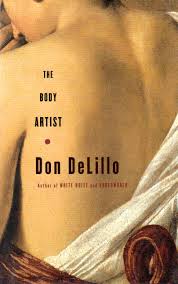DeLillo, Don (2001). The Body Artist. New York: Scribner.
This short book (125 pp) by an acclaimed master novelist is perplexing, disturbing, and confusing, yet also haunting, dense, and impressive from a craft standpoint. What’s it about? I’m not sure. It might be about the grieving process after losing a loved one. It might be a ghost story. It might be a philosophical exploration of time and language. It might be pure prose poetry. It’s definitely experimental fiction, reminiscent of Ondaatje’s Coming Through Slaughter.
In a stunning opening chapter, a couple has breakfast in a country house. The POV is the woman’s stream of consciousness and her mind is loopy and forgetful. Is she merely undercaffeinated, or is there something wrong with her? The dialog is a masterpiece of minimalism that could be shown in writing courses. The tempo of the language mirrors the birds at the bird feeder.
Breakfast is over, he drives off to work, and she learns he committed suicide in his New York apartment. She grieves. She finds a young man, a boy, sitting in an unused room on the third floor. He is unable to speak coherently. He may be mentally abnormal. He may be a ghost. He speaks in riddles. The center part of the book shows her trying to communicate with him, and wondering who or what he is. He disappears one day.
In the last chapter, the woman leaves the country house, moves to the city and becomes a dancer/actor/artist in some kind of weird experimental theater performance in which she takes on multiple roles, of both genders. I think that chapter could unlock the meaning of the whole narrative, if only the key fit something.
The virtues of this work of fiction (is it a novel?), are many, including DeLillo’s finely turned sentences, bullseye descriptions, and tone-perfect dialog. The writing shows some of his signature nonsequitur narration (per White Noise), as undercurrent. The story lacks overt dramatic tension but as a study of the consciousness of grief, and a meditation on the meaning of time and existence, it reaches poetic standards of compression and allusion. It also opens up one’s thinking about what is possible in fiction. I loved this book, but there are few people I could recommend it to.

